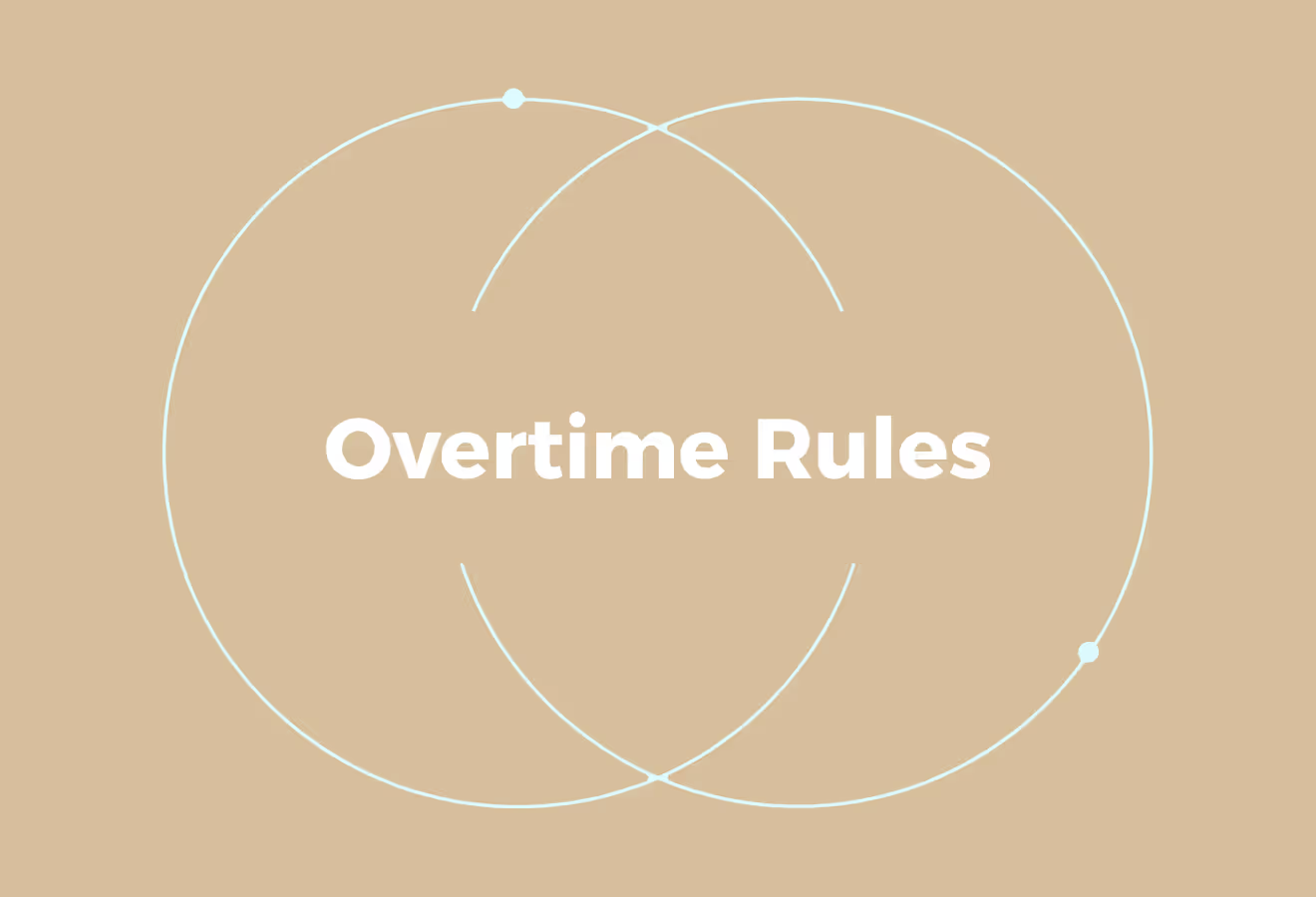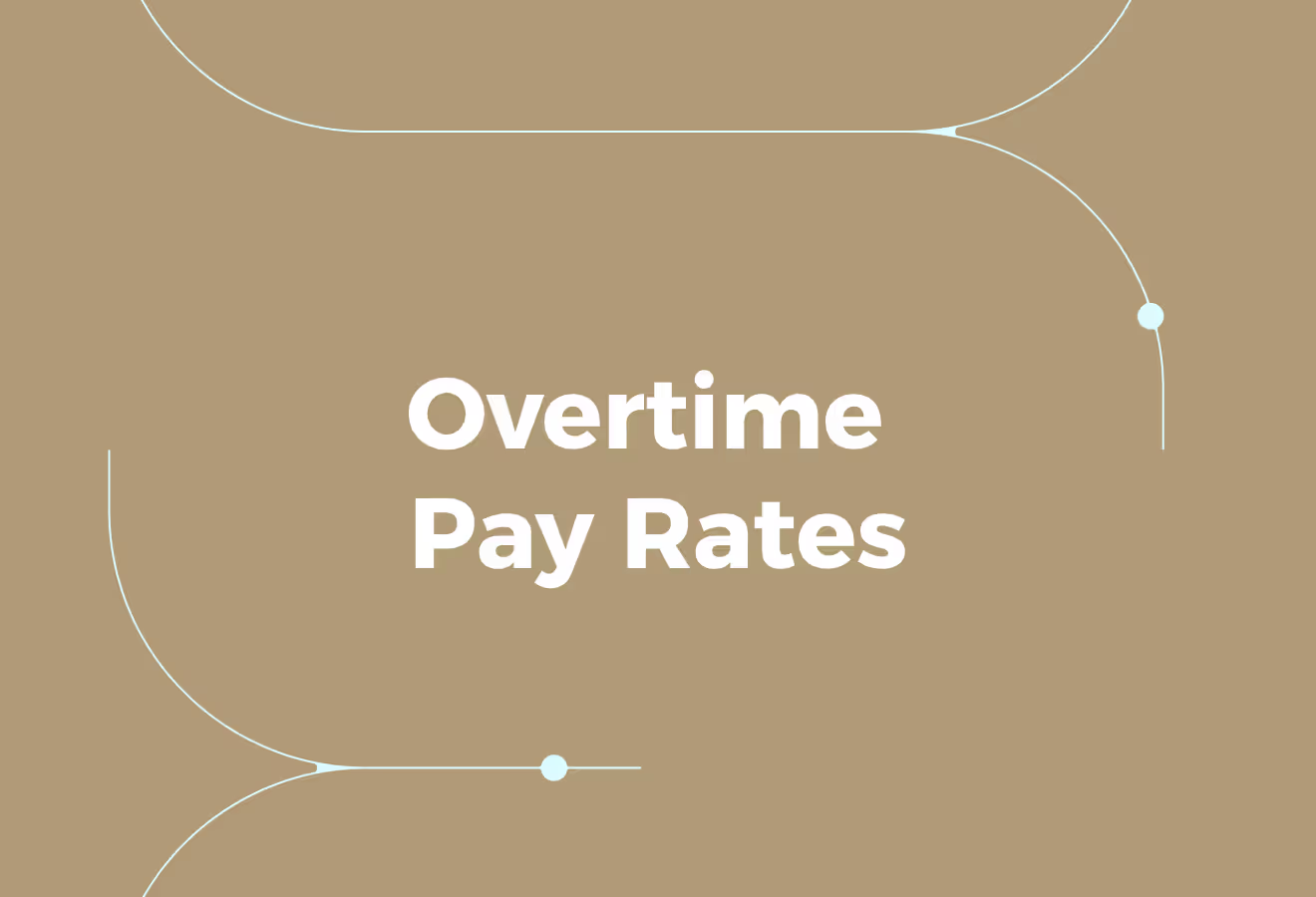Overtime Calculation in UAE (Employer’s Guide to Rules & Compliance)
.avif)
When it comes to calculating overtime pay, the rules can be tricky. Let's say you're an HR manager at a company based in Dubai. One day, an employee approaches you with a question about their pay. They tell you they worked extra hours on a project. Instead of feeling pleased about their contribution, they are concerned about how it will affect their salary. The employee is particularly worried about how many of the extra hours will be considered overtime and what rate their overtime pay will be calculated at. If you're not up to date on the overtime calculation rules in the UAE, this scenario could be a real challenge. In this article, we'll break down the rules governing overtime calculation in the UAE. Doing so will help you respond to employee queries with confidence and ensure your business remains compliant with local labour laws.
Cercli’s UAE salary guide will help you better understand overtime calculations in the UAE. By integrating a global HR system, businesses can centralize payroll and compliance processes, making it easier to manage overtime calculations accurately across regions. This resource will not only help you understand the basics of overtime calculations and assist with employee queries, but it will also ensure your business pays employees accurately and remains compliant with local labour laws
The Essential Rules for Overtime in the UAE

The UAE Labour Law clearly outlines the provisions for working hours and overtime, protecting employees while ensuring flexibility for employers. These provisions apply across the Emirates, including Dubai, and reflect the UAE’s balanced and structured approach to employment regulation.
How Many Hours are Considered Overtime in the UAE?
For most sectors, Article 17 of Federal Decree Law No. 33 of 2021 on the Regulation of Labour Relations in the Private Sector (the ‘UAE Labour Law’), identifies the regular working hours for the private sector as 8 hours per day, or 48 hours per week. During Ramadan, these hours are typically reduced by two each day. Employees who work five consecutive hours must be given one or more breaks totalling not less than one hour. These breaks are not included in the calculation of working hours.
Who is Entitled to Overtime Pay in the UAE?
Overtime provisions apply to the majority of workers. Certain categories of employees are exempt, including those in managerial or supervisory roles, or those in positions of trust, where their work requires them to manage or oversee business operations independently.
Whether a role qualifies for exemption depends on the actual job duties, not just the job title.
How Does Overtime Work in the UAE?
An employer may require an employee to work overtime if there is a genuine need. Overtime must not exceed two hours per day, except in situations where work is essential to prevent substantial loss or avoid a serious accident.
What is Overtime Compensation in the UAE?
Where an employee is asked to work beyond the standard daily hours, they are entitled to additional pay.
The calculation of overtime wages is different for:
- Working on regular working days
- Working between 10 p.m. and 4 a.m.
- Working on rest days or public holidays
It’s crucial for employers to accurately document overtime hours and ensure that payment is made by the law.
Related Reading
Overtime Pay Rates and Scenarios

The UAE has established rules for calculating overtime. These rules ensure that any additional work performed beyond contracted hours is both properly documented and fairly paid. Employers are encouraged to maintain accurate time records and communicate clearly with employees about work expectations that extend beyond standard hours.
Regular Overtime on a Working Day
When an employee works beyond the standard eight hours in a day, they are entitled to an overtime rate of 125% of their basic hourly wage. This reflects the employee’s basic hourly pay plus a 25% supplement.
Night Shift Overtime (10 p.m. – 4 a.m)
If an employee works overtime between 10 p.m. and 4 a.m., they are generally entitled to 150% of their basic hourly wage (their normal hourly rate plus a 50% premium).
However, this rule does not automatically apply to employees whose roles normally require them to work at night. Article 19 of the UAE Labour Law specifies that employees hired for permanent or scheduled night shifts may not be entitled to the 150% premium, unless their employment contract or company policy provides otherwise.
Overtime on Rest Days or Public Holidays
If an employee is asked to work during an official public holiday or on their designated rest day, the employer must choose one of two options. They can grant an additional day off as compensation or pay 150% of the employee’s basic hourly wage for the hours worked if a compensatory day off is not provided.
This provision ensures that employees who give up their rest periods or holidays are fairly compensated.
Simplifying HR and Payroll in the MENA Region
Cercli is designed for companies in the Middle East that need a flexible, compliant, and reliable way to manage their workforce, whether teams are local, remote, or spread across multiple countries.
Built for the realities of doing business in the region, Cercli helps companies in the UAE, Saudi Arabia, and across MENA simplify HR operations, stay fully compliant with local regulations, and run payroll with confidence.
Step-by-Step Process: How to Calculate Overtime Pay

Determine the Basic Hourly Wage
Calculating the employee's basic hourly wage is the first step in any overtime calculation in UAE. To do this, you must first calculate the employee's daily salary and then determine the hourly rate based on that daily wage.
For example, let's say the employee earns AED 4,000 per month:
Daily wage = AED 4,000 ÷ 30 = AED 133.33
Hourly wage = AED 133.33 ÷ 8 = AED 16.67
Apply the Correct Overtime Rate
The next step is to apply the correct overtime rate.
The applicable rate depends on when the overtime hours were worked:
- Regular working day: Multiply the basic hourly wage by 1.25
- Night shift (10 p.m. – 4 a.m.), rest day, or public holiday: Multiply the basic hourly wage by 1.5
Continuing the example, if the basic hourly rate is AED 16.67, then:
Regular overtime rate = AED 16.67 × 1.25 = AED 20.84
Multiply by Total Overtime Hours
Once you've calculated the correct overtime hourly rate, multiply it by the number of extra hours worked.
For example, 10 hours of regular day overtime would be calculated as follows:
Overtime pay = 10 × AED 20.84 = AED 208.40
This step-by-step approach ensures consistency and accuracy in payroll practices. Employers are encouraged to keep detailed records of working hours, overtime requests, and approvals to support proper documentation. In Dubai and across the UAE, these regulations help maintain fairness while supporting efficient workplace management.
Related Reading
Payroll Mistakes & Best Practice Tips: Common Payroll Mistakes

Payroll mistakes can lead to disputes or penalties. Here are common missteps to avoid.
Misclassifying the Basic Salary
A frequent error is calculating overtime based on gross salary, which may include allowances such as housing or transport. Under UAE Labour Law, overtime pay must be based solely on the basic salary, not the gross amount. Using the wrong figure inflates entitlements and can lead to overpayments or audit issues.
Failing to Document Overtime Properly
Without clear records of overtime hours and their approval, employers expose themselves to legal risk. If a dispute arises and there’s no formal tracking or sign-off process, the employee’s word may be given more weight.
Missing WPS Requirements
Overtime wages must be paid promptly and through the Wages Protection System (WPS) for employers registered under MoHRE. Manual payments or unreported amounts violate UAE compliance rules, which are closely monitored.
Exceeding Legal Overtime Limits
UAE Labour Law limits overtime to a maximum of two hours per day, except in emergency or exceptional cases. Exceeding this limit without valid justification or proper compensation may be considered a breach of labour regulations.
Overlooking Policy Updates
Labour laws are occasionally amended, including provisions around overtime and wage calculations. Employers who fail to keep their internal policies and contracts up to date risk non-compliance, even if their intentions are correct.
Best Practice Tips
These best practice tips can help payroll managers avoid costly mistakes and maintain compliance with UAE Labour Laws.
Maintain Transparent Records
Use timesheets, electronic attendance systems, or internal forms to track overtime. Require employees to sign off on the hours they have worked, and have managers formally approve these hours.
Pay Accurately and On Time
Ensure calculations follow the proper method, based on basic salary and the applicable overtime rate (125% or 150% depending on the scenario). Payments should be made without delay.
Cap Overtime and Get Consent
Avoid asking employees to work beyond their legal limits. Where overtime is necessary, ensure it is agreed upon in advance and documented to prevent potential complaints or refusals to work.
Regularly Review Payroll Practices
Stay updated on UAE Labour Law changes, and revise your internal payroll and HR procedures accordingly. If needed, seek guidance from registered advisors or refer directly to MoHRE updates for further information.
Train Payroll and HR Staff
Ensure those handling calculations and payments understand both the law and internal policy. Mistakes often stem from inconsistent understanding, not intent.
Book a Demo to Speak with Our Team about Our Global HR System
Cercli is built for companies in the Middle East to manage their workforce, whether local or across 150+ countries, from a single platform. Run compliant payroll across the UAE, Saudi Arabia, and the wider MENA region, manage leave, onboard employees, track assets, and handle global contractor payments in multiple currencies.
Whether you’re managing 25 employees or scaling to over 500 across multiple markets, Cercli combines local expertise with global capabilities, providing your HR team with a compliant system to run operations and pay your workforce anywhere. Book a demo to see how Cercli helps MENA companies simplify HR, payroll, and global team management, while staying compliant.
Related Reading










